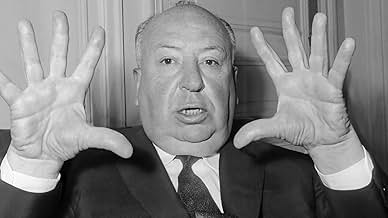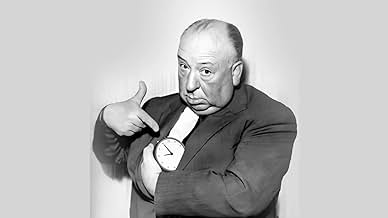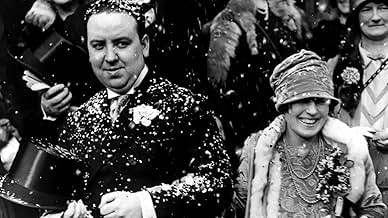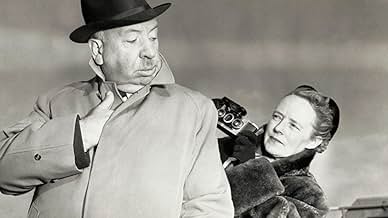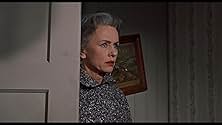AVALIAÇÃO DA IMDb
6,6/10
527
SUA AVALIAÇÃO
Adicionar um enredo no seu idiomaA fictional Alfred Hitchcock narrates an explanation of some of the lesser known cinematic techniques he used in his movies, richly illustrated with clips from his entire 50-year career.A fictional Alfred Hitchcock narrates an explanation of some of the lesser known cinematic techniques he used in his movies, richly illustrated with clips from his entire 50-year career.A fictional Alfred Hitchcock narrates an explanation of some of the lesser known cinematic techniques he used in his movies, richly illustrated with clips from his entire 50-year career.
Sean Connery
- Self
- (cenas de arquivo)
Alfred Hitchcock
- Self
- (cenas de arquivo)
Paul Newman
- Self
- (cenas de arquivo)
John Wayne
- Self
- (cenas de arquivo)
James Stewart
- Self
- (cenas de arquivo)
Julie Andrews
- Self
- (cenas de arquivo)
Grace Kelly
- Self
- (cenas de arquivo)
Bruce Dern
- Self
- (cenas de arquivo)
Cary Grant
- Self
- (cenas de arquivo)
Henry Fonda
- Self
- (cenas de arquivo)
Anthony Perkins
- Self
- (cenas de arquivo)
Shirley MacLaine
- Self
- (cenas de arquivo)
Laurence Olivier
- Self
- (cenas de arquivo)
Gregory Peck
- Self
- (cenas de arquivo)
Tippi Hedren
- Self
- (cenas de arquivo)
Janet Leigh
- Self
- (cenas de arquivo)
Ingrid Bergman
- Self
- (cenas de arquivo)
Avaliações em destaque
Now this opens with an impossible statement - and that works! For what we get over the next couple of hours is quite a plausible assessment by the man himself of just what made him tick. He explains in six, admittedly rather contrived, stages just what fuelled the creative processes as he assembled a body of work the like of which we shall never see again. Starting in the late 1920s, we are led on a tour of his styles, his inspirations, his techniques and it's a name-dropper's wet dream. His routine referrals to Cary (Carey, of course), Grace, Tippi, Kim, Jimmy - even "Hank" (Fonda) give the whole thing an added intimacy as he explains (and betrays) some of the secrets of his directing - and of their acting, too. Now it is too long, and after a while I was wondering just how it could string out for two hours, but the style of the narration remains friendly and engaging. He has a cheekiness, and the "don't you think?" or "wouldn't you?" style or response-inducing dialogue made me feel a bit more involved. There are no contributors at all - but the archive is extensively used and illustrates well the range of stories, the talent and the duration of this director's career before dying at a decent age in 1980. If you are a fan of cinema, or "Hitch" or with both, then this is well worth a watch. I'm not sure it needs to be in a cinema though, and actually it might work better as a two-part documentary on the television. It is certainly quite a captivating watch.
This film will undoubtedly become a must-watch for film students. Watching it makes it clear that Hitchcock was a true pioneer, and many filmmaking techniques originated from his creations. Also the sheer volume of work he produced was immense.
As someone who isn't a film student, I probably felt that some parts were a bit wasted on me, and I would have preferred if it ended 20-30 minutes earlier. Occasionally, it seemed like there wasn't enough source content, resulting in repetitive shots of Hitchcock's photographs.
However, apart from that, the production was excellent, and I gained valuable insights into Hitchcock's films. It is definitely more of an essay about his work than it is an insight into his person. The narration by Alistair McGowan was excellent and the film is a fitting tribute to an historic man.
As someone who isn't a film student, I probably felt that some parts were a bit wasted on me, and I would have preferred if it ended 20-30 minutes earlier. Occasionally, it seemed like there wasn't enough source content, resulting in repetitive shots of Hitchcock's photographs.
However, apart from that, the production was excellent, and I gained valuable insights into Hitchcock's films. It is definitely more of an essay about his work than it is an insight into his person. The narration by Alistair McGowan was excellent and the film is a fitting tribute to an historic man.
Greetings again from the darkness. It takes a cinephile and documentarian of Mark Cousins ability to pull off such a treat for other cinephiles, especially fans of "The Master of Suspense." This felt like a two-hour geek-out that I wished would never end. Of course, the early title card that read "Written and Voiced by Alfred Hitchcock" tipped us that this would be no ordinary biopic. It's been more than 40 years since Hitchcock died (1980 at age 80), and his career spanned 1925 through 1976. His oeuvre firmly established his place among the greatest filmmakers, featuring at least eight all-time classics.
Alistair McGowan provides the voice acting that so closely mimics that instantly recognizable Hitchcock oratory prowess, and Cousins infuses the necessary sly wit that we came to expect during Hitchcock's TV work (unmentioned here). Perhaps no other filmmaker has had their film work so thoroughly analyzed over the year, and yet Cousins brilliantly adapts a new approach. He structures the analysis via 6 categories, and then proceeds to provide archival footage and film clips as 'proof' as 'Hitch' guides us through.
These categories include: 1. Escape - the segment shows various characters in different stages of trying or needing to remove themselves from a particular situation, often danger. This is the longest segment and emphasizes Hitch's use of 'opening a door' to welcome viewers inside the movie.
2. Desire - pretty much the opposite of 'escape', this reinforces the power of lust, desire, and sex to motivate a character's actions.
3. Loneliness - this segment is a mashup of loneliness, solitude, and discomfort - kind of a catch-all category of those all alone in a moment.
4. Time or Timing - the proverbial race against the clock is sometimes quite real for characters in suspense or mystery films. Cutting it a bit too close qualifies as well.
5. Fulfillment - an unusual segment in that it mentions love and then focuses on the personal life of Alfred and his wife (and collaborator) Alma. Shown are their London townhouse, their country estate outside of London, and their U. S. home in Santa Cruz, California.
6. Height - back to film analysis, we see the frequent use of going high with the camera and shooting down at the scene. It's a useful lesson in how the camera is a tool for the director.
I have purposefully not included the film titles with clips utilized for each category so as not to spoil the surprises and dull the impact. You should know that the clips fit perfectly, making this a nice film technique education, as well as a different approach to viewing Hitchcock movies. I believe the only two other directors mentioned here are Bergman and Murnau, both of whom influenced Hitchcock - just as Hitchcock has influenced so many filmmakers since. Cousins does forego any mention of the questionable persona and actions that have been associated with Hitchcock over the years, and that's likely because this documentary wants us zeroed in on techniques that make up Hitchcock films. It's difficult to imagine any Hitchcock fan not finding this to be a hypnotic experience of learning and appreciation.
In select theaters in NYC and Los Angeles on October 25, 2024.
Alistair McGowan provides the voice acting that so closely mimics that instantly recognizable Hitchcock oratory prowess, and Cousins infuses the necessary sly wit that we came to expect during Hitchcock's TV work (unmentioned here). Perhaps no other filmmaker has had their film work so thoroughly analyzed over the year, and yet Cousins brilliantly adapts a new approach. He structures the analysis via 6 categories, and then proceeds to provide archival footage and film clips as 'proof' as 'Hitch' guides us through.
These categories include: 1. Escape - the segment shows various characters in different stages of trying or needing to remove themselves from a particular situation, often danger. This is the longest segment and emphasizes Hitch's use of 'opening a door' to welcome viewers inside the movie.
2. Desire - pretty much the opposite of 'escape', this reinforces the power of lust, desire, and sex to motivate a character's actions.
3. Loneliness - this segment is a mashup of loneliness, solitude, and discomfort - kind of a catch-all category of those all alone in a moment.
4. Time or Timing - the proverbial race against the clock is sometimes quite real for characters in suspense or mystery films. Cutting it a bit too close qualifies as well.
5. Fulfillment - an unusual segment in that it mentions love and then focuses on the personal life of Alfred and his wife (and collaborator) Alma. Shown are their London townhouse, their country estate outside of London, and their U. S. home in Santa Cruz, California.
6. Height - back to film analysis, we see the frequent use of going high with the camera and shooting down at the scene. It's a useful lesson in how the camera is a tool for the director.
I have purposefully not included the film titles with clips utilized for each category so as not to spoil the surprises and dull the impact. You should know that the clips fit perfectly, making this a nice film technique education, as well as a different approach to viewing Hitchcock movies. I believe the only two other directors mentioned here are Bergman and Murnau, both of whom influenced Hitchcock - just as Hitchcock has influenced so many filmmakers since. Cousins does forego any mention of the questionable persona and actions that have been associated with Hitchcock over the years, and that's likely because this documentary wants us zeroed in on techniques that make up Hitchcock films. It's difficult to imagine any Hitchcock fan not finding this to be a hypnotic experience of learning and appreciation.
In select theaters in NYC and Los Angeles on October 25, 2024.
Questions about Hitchcock's films and life will be answered in this good documentary. Some of his films were undisputed masterpieces and their past or immediate impact and future influence on filmmakers were and will be enormous and cannot be underestimated. My Name Is Alfred Hitchcock(2022) pays tribute to Hitch's films with scenes from Rebecca, Suspicion, Notorious, Shadow of a Doubt, Foreign Correspondent, Lifeboat, The Rope, Strangers on a Train, Rear Window, Vertigo, The Man who Knew Too Much, North by Northwest, To Catch a Thief, The Birds, Topaz, Torn Curtain, Frenzy and even the only non-thriller directed by Hitch: Mr. And Mrs. Smith. And of course, "Psycho" was not only Hitchcock's most successful film, it was a phenomenon in itself and the highlight of the film is, of course, the shower scene with 78 shots and 52 cuts that changed cinema forever. There's an unprecedented look at the iconic shower scene in Alfred Hitchcock's Psycho (1960), a tribute to the film of the master's best-known thriller.
2022 marked the centenary of Hitchcock's first feature film. A century later he remains one of the most influential filmmakers in the history of cinema. This documentary/homage was well written, produced and directed by Mark Cousins, it reexamines the vast filmography and legacy of one of the greatest filmmakers of the 20th century through his own voice. Explore the work and personality of the British director who managed to fascinate the public with films such as ¨Rear Window¨, Vertigo¨, ¨North by Northwest¨ or ¨Psycho¨. A cinematographic essay that analyzes Hitch's public personality, and delves deeply into his works, including the lesser-known ones and those from his silent era. As a fictional Alfred Hitchcock narrates an explanation of some of the lesser known cinematic techniques he used in his movies, richly illustrated with clips from his entire 50-year career. Depicting Hitch's early British period when he directed silent films such as the successful ¨The lodger¨ (1926) , ¨The ring¨(1927) , ¨Easy virtue¨ (1927) , ¨The Manxman¨(29) ; being ¨Blackmail¨(29) made as a silent , this was reworked to become a talkie . Following sound movies and early talkies as ¨June and the Paycock¨(30) , ¨Skin Game¨(31) , ¨Rich and strange¨(32) , ¨Number 17¨(32) , ¨The man who knew too much¨(34) , ¨The 39 steps¨ (35) , ¨The secret agent¨(36) , ¨Blackmail¨(36) , ¨The lady vanishes¨(38) . After ¨39 Steps¨ and ¨Jamaica Inn¨, Hitch was encouraged to go to America and quickly filmed his first work in Hollywood hired by the great producer David O'Selznick to shoot ¨Rebecca¨ and after ¨Suspicion¨, ¨Notorious¨ and ¨Spellbound¨. Because Hitch felt controlled by O'Selznick, he founded his own company Trasatlantic along with Sidney Bernstein with which he produced ¨Rope¨ and the flop ¨Under Capricorn¨.
Mark Cousins, the award-winning filmmaker behind ¨The History of Cinema: An Odyssey¨, ¨The eyes of Orson Welles¨ and ¨The storms of Jeremy Thomas¨, approaches the iconic British author with a radical new approach: through of his own voice. As Hitch rewatches his films, we embark on an odyssey through a vast career: his vivid silent films and the legendary films of the 50s and 60s and the subsequent ones. Although Hitch was nominated for an Oscar 5 times, he never won the Academy Award for Best Director, however he finally won the honorary Oscar and was lovingly honored by the American Film Institute with the attendance of the greatest Hollywood stars of the past and present. My Name Is Alfred Hitchcock(2022) was screened at the 2023 Glasgow International Film Festival and other Festivals, winning various prizes and nominations.
2022 marked the centenary of Hitchcock's first feature film. A century later he remains one of the most influential filmmakers in the history of cinema. This documentary/homage was well written, produced and directed by Mark Cousins, it reexamines the vast filmography and legacy of one of the greatest filmmakers of the 20th century through his own voice. Explore the work and personality of the British director who managed to fascinate the public with films such as ¨Rear Window¨, Vertigo¨, ¨North by Northwest¨ or ¨Psycho¨. A cinematographic essay that analyzes Hitch's public personality, and delves deeply into his works, including the lesser-known ones and those from his silent era. As a fictional Alfred Hitchcock narrates an explanation of some of the lesser known cinematic techniques he used in his movies, richly illustrated with clips from his entire 50-year career. Depicting Hitch's early British period when he directed silent films such as the successful ¨The lodger¨ (1926) , ¨The ring¨(1927) , ¨Easy virtue¨ (1927) , ¨The Manxman¨(29) ; being ¨Blackmail¨(29) made as a silent , this was reworked to become a talkie . Following sound movies and early talkies as ¨June and the Paycock¨(30) , ¨Skin Game¨(31) , ¨Rich and strange¨(32) , ¨Number 17¨(32) , ¨The man who knew too much¨(34) , ¨The 39 steps¨ (35) , ¨The secret agent¨(36) , ¨Blackmail¨(36) , ¨The lady vanishes¨(38) . After ¨39 Steps¨ and ¨Jamaica Inn¨, Hitch was encouraged to go to America and quickly filmed his first work in Hollywood hired by the great producer David O'Selznick to shoot ¨Rebecca¨ and after ¨Suspicion¨, ¨Notorious¨ and ¨Spellbound¨. Because Hitch felt controlled by O'Selznick, he founded his own company Trasatlantic along with Sidney Bernstein with which he produced ¨Rope¨ and the flop ¨Under Capricorn¨.
Mark Cousins, the award-winning filmmaker behind ¨The History of Cinema: An Odyssey¨, ¨The eyes of Orson Welles¨ and ¨The storms of Jeremy Thomas¨, approaches the iconic British author with a radical new approach: through of his own voice. As Hitch rewatches his films, we embark on an odyssey through a vast career: his vivid silent films and the legendary films of the 50s and 60s and the subsequent ones. Although Hitch was nominated for an Oscar 5 times, he never won the Academy Award for Best Director, however he finally won the honorary Oscar and was lovingly honored by the American Film Institute with the attendance of the greatest Hollywood stars of the past and present. My Name Is Alfred Hitchcock(2022) was screened at the 2023 Glasgow International Film Festival and other Festivals, winning various prizes and nominations.
Really well structured and researched.
The documentary makers have delved into Mr. Hitchcock's earliest works from the silent era to his iconic "Vertigo" and "The Birds". The analysis of Alfred Hitchcock's filmmaking techniques has been broken down under titles like "Escape" and "Fulfilment". The script is in the first person and imagines Mr. Hitchcock narrating montages of his works, although repetition of the same images over and over, and the droning narration can be irritating. Nevertheless, this is a novel presentation and a valuable addition to the huge body of study of Alfred Hitchcock's works. Students of film and film buffs will certainly enjoy it. I would have rated higher except the pace is uneven and often very, very slow.
The documentary makers have delved into Mr. Hitchcock's earliest works from the silent era to his iconic "Vertigo" and "The Birds". The analysis of Alfred Hitchcock's filmmaking techniques has been broken down under titles like "Escape" and "Fulfilment". The script is in the first person and imagines Mr. Hitchcock narrating montages of his works, although repetition of the same images over and over, and the droning narration can be irritating. Nevertheless, this is a novel presentation and a valuable addition to the huge body of study of Alfred Hitchcock's works. Students of film and film buffs will certainly enjoy it. I would have rated higher except the pace is uneven and often very, very slow.
Você sabia?
- CuriosidadesThe only two films that are mentioned and have clips from them that are not by Alfred Hitchcock are A Última Gargalhada (1924) and Rastros de Ódio (1956).
- Erros de gravaçãoDuring a clip from "North by Northwest," "Hitchcock" mentions that Cary Grant is drinking a martini. In fact, it's a Manhattan.
- ConexõesFeatures A Última Gargalhada (1924)
Principais escolhas
Faça login para avaliar e ver a lista de recomendações personalizadas
- How long is My Name Is Alfred Hitchcock?Fornecido pela Alexa
Detalhes
- Data de lançamento
- País de origem
- Idioma
- Também conhecido como
- My Name Is Alfred Hitchcock
- Empresa de produção
- Consulte mais créditos da empresa na IMDbPro
Bilheteria
- Faturamento bruto mundial
- US$ 63.620
- Tempo de duração2 horas
- Cor
Contribua para esta página
Sugerir uma alteração ou adicionar conteúdo ausente

Principal brecha
By what name was Meu Nome É Alfred Hitchcock (2022) officially released in India in English?
Responda

![Tráiler [ES]](https://m.media-amazon.com/images/M/MV5BYWY5MTYzZTctNWFlNy00OTUwLTkwMTctOWM5M2QxOTlmMWYzXkEyXkFqcGdeQXRyYW5zY29kZS13b3JrZmxvdw@@._V1_QL75_UX500_CR0)
